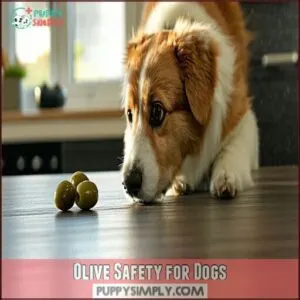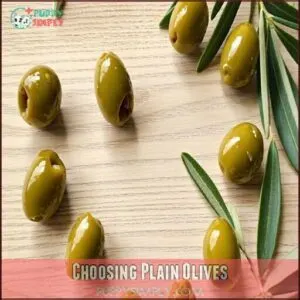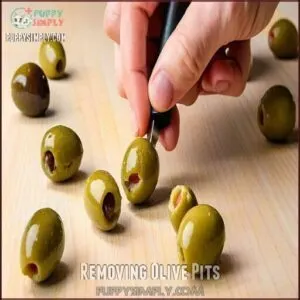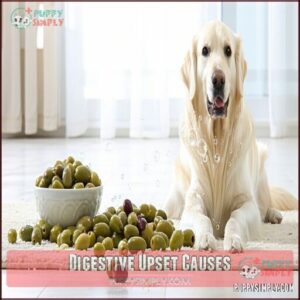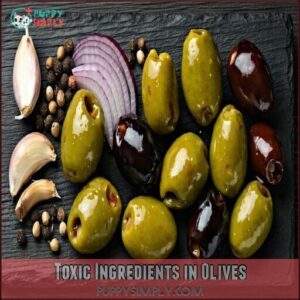This site is supported by our readers. We may earn a commission, at no cost to you, if you purchase through links.
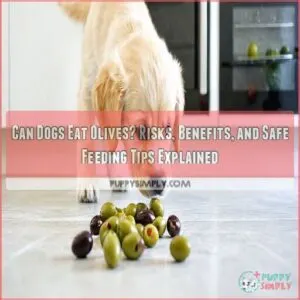
Plain, unsalted olives are generally safe, but avoid those with pits—they can cause choking or blockages.
Watch out for high sodium levels in canned or jarred olives, as too much salt isn’t good for your pup.
Skip any olives seasoned with garlic, onion, or other harmful ingredients.
While olives offer healthy fats and antioxidants, they’re best as an occasional treat, not a regular snack.
Keep an eye on your dog for any signs of digestive upset after eating.
Curious about the benefits or risks? Let’s unpack more!
Table Of Contents
Key Takeaways
- Stick to plain, unsalted, and pitted olives to keep your dog safe.
- Avoid brined, seasoned, or stuffed olives as they can harm your dog’s health.
- Feed olives in moderation to prevent digestive issues or sodium toxicity.
- Watch for adverse reactions like vomiting or diarrhea after feeding olives.
Olive Safety for Dogs
When feeding olives to your dog, it’s important to keep in mind potential risks like choking or digestive blockages.
High sodium levels in certain olives can also pose health concerns, especially for dogs with existing conditions.
General Safety Risks
Feeding olives to dogs comes with some risks. While plain olives are safe in small quantities, overindulgence can lead to issues like sodium toxicity or digestive problems.
Plain olives in moderation are safe for dogs, but too many can cause sodium toxicity or digestive troubles.
Olive pit dangers shouldn’t be ignored either. Remember that dogs can enjoy olives in moderation.
Keep these risks in mind:
- High sodium levels in brined olives
- Digestive issues from excessive consumption
- Extra calories leading to weight gain
- Olive risks for dogs with sensitive stomachs
Choking Hazards
When letting your dog eat olives, always remove the pits.
Always remove olive pits to prevent choking or blockages—simple steps can make treats safer for your furry friend.
Olive pits can match the size of a dog’s airway, causing swallowing difficulties or choking.
Smaller breeds face higher risks due to their size.
If choking occurs, emergency actions like the Heimlich maneuver may be needed.
Prevention tips include choosing pitted olives and supervising your dog during treats, which can help prevent choking.
Intestinal Blockages
If a dog eats olive pits, their size can lead to serious intestinal blockages.
Blockage severity depends on the pit’s shape and the dog’s size, sometimes requiring surgical removal.
Preventative measures, like removing pits before offering olives for dogs, are essential.
Even if a dog eats olives safely, pits can impact their dietary health and cause choking or intestinal blockage.
High Sodium Levels
After considering blockages, think about sodium in olives.
High sodium levels can lead to dehydration, salt toxicosis, or even sodium poisoning in dogs.
Brined olives are especially risky, causing health complications like vomiting or seizures.
Stick to moderation strategies and safe alternatives like plain, unsalted olives.
Always prioritize your dog’s health by avoiding unnecessary salt and keeping treats simple.
Can Dogs Eat Olives
Yes, dogs can eat olives, but moderation is key.
Plain, pitted olives are generally safe, but always watch out for potential risks.
Here’s what to know:
- Olive Preparation: Stick to plain, unsalted varieties without added spices or seasonings.
- Olive Variety: Both black and green olives are safe if pitted and plain.
- Olive Quantities: Limit to one or two as an occasional treat to avoid overfeeding.
Excessive consumption can lead to weight gain and pancreatitis due to the high fat content.
- Olive Allergies: Monitor for any adverse reactions, like vomiting or diarrhea.
Always prioritize your dog’s safety!
Olive Nutrition Benefits
Olives offer healthy fats, antioxidants, and essential nutrients that can support your dog’s overall health.
When given in moderation, they may promote better digestion, a shiny coat, and a stronger immune system.
Healthy Fats and Proteins
Olives for dogs aren’t just tasty—they offer healthy fats and proteins that support fat digestion, protein absorption, and overall energy.
These nutrients can enhance coat health and aid muscle building.
| Benefit | Nutrient | Impact on Dogs |
|---|---|---|
| Coat Health | Healthy Fats | Shinier, softer coat |
| Muscle Building | Proteins | Stronger muscles |
| Energy Source | Natural Fats | Sustained energy levels |
| Fat Digestion Aid | Monounsaturated | Improved metabolism |
Moderation is key to accessing these olive benefits for dogs, ensuring they receive the necessary proteins for optimal health.
Antioxidant Properties
Antioxidants in olives for dogs help combat free radicals, offering cellular protection and potential disease prevention.
These anti-inflammatory properties may reduce joint pain and support cognitive benefits in aging pups.
While olives aren’t essential, their antioxidant-rich profile can complement a balanced diet. Stick to plain, pitted olives in moderation to safely explore these olive benefits for dogs.
Vitamins and Minerals Content
Regarding olive nutrition for dogs, the vitamins and minerals pack a punch.
These tiny fruits provide Vitamin E for healthy skin, calcium for strong bones, and iron to aid red blood cell production. Plus, the potassium levels support muscle function.
- Vitamin K benefits: Helps with blood clotting.
- Calcium sources: Strengthens teeth.
- Vitamin E effects: Boosts coat health.
Immune System Support
Boosting your dog’s immune system can be as simple as offering olives in moderation.
Packed with antioxidants and vitamin E, they support cellular protection and dog immune function.
Their anti-inflammatory properties help reduce inflammation, while healthy fats and minerals provide a solid foundation for overall wellness.
| Nutrient | Benefit | Supports | Key Role | Found In |
|---|---|---|---|---|
| Antioxidants | Cellular Protection | Immune System | Reduces Damage | Olives |
| Vitamin E | Regulates Processes | Dog Health | Boosts Immunity | Olives |
| Healthy Fats | Energy Supply | Body Functions | Reduces Inflammation | Olives |
| Minerals | Nutrient Support | Bone Health | Strengthens Body | Olives |
| Anti-inflammatory | Reduces Inflammation | Immune System | Supports Recovery | Olives |
Heart Health Benefits
A small amount of olives can support dog heart health thanks to their healthy fats and antioxidants.
These nutrients help reduce cholesterol, lower blood pressure, and promote inflammation reduction, offering cardiovascular support.
Vitamin E in olives also aids long-term heart health.
Supplementing with olive oil boosts these benefits.
Just remember, moderation is key to avoid overloading your pup’s diet while still reaping these heart-friendly benefits.
Feeding Olives to Dogs
When feeding olives to your dog, it’s important to keep them plain, pitted, and unsalted.
Offering them in moderation can help avoid potential health risks like choking or digestive upset, with moderation being key to their safe consumption.
Choosing Plain Olives
When choosing olives for dogs, stick to plain, unsalted varieties.
Avoid brined or seasoned options since sodium isn’t safe for dogs. Opt for fresh olives or those packed simply without additives.
Pitted olives are best to lower risks. Olive preparation is key—keeping it plain makes it safer for moderation.
Remember, olives should only be an occasional treat.
Removing Olive Pits
Removing pits from olives is key to keeping your dog safe. Those small pits are choking hazards and can even cause blockages.
To prepare, consider the following steps:
- Use pitting tools to remove pits quickly.
- Try DIY methods, like slicing olives to extract pits.
- Take safety precautions to avoid leaving fragments.
Always opt for supervised pitting to guarantee clean, pit-free olives. A specialized tool can help, so consider an olive pitting device.
Healthy Treat Alternatives
If olives seem tricky, there are plenty of safe snacks dogs will love.
Safe fruits like blueberries or apple slices (without seeds) make great treats. Veggie options such as carrots are crunchy and healthy.
Protein snacks like plain cooked chicken work too. You can also explore commercial treat options for variety.
You can also explore healthy dog treats from commercial brands or homemade recipes for variety.
Moderation Guidelines
When feeding olives to dogs, moderation is key.
Stick to a small serving size—one or two plain, pitted olives as an occasional treat. Overdoing it can disrupt dietary balance and increase calorie intake.
Ensuring proper olive preparation is essential for your pet’s well-being.
Treat frequency should be rare, as different breeds have varying tolerances. Always prioritize dog safety by considering their unique needs and keeping treats minimal.
Monitoring for Adverse Reactions
After feeding olives in moderation, keep an eye out for any unusual behavior.
Dog reaction monitoring helps catch issues early.
Watch for:
- Vomiting Signs
- Diarrhea Watch
- Allergy Symptoms (like itching or swelling)
- Lethargy Check
- Stool Changes
If symptoms appear, it might indicate dog olive overconsumption or allergic reactions.
Seek veterinarian advice promptly.
Olive Consumption Risks
Feeding olives to your dog comes with several potential risks you should know about. From choking hazards to high sodium levels, understanding these dangers can help you make safer choices.
Sodium Toxicity Risks
Too much sodium in olives can harm your dog.
Sodium overload may lead to dehydration symptoms like excessive thirst or lethargy.
If sodium levels exceed the toxicity threshold, seizures or worse could follow.
Always opt for safe alternatives like plain, unsalted olives.
Consult a vet if needed.
| Sodium Toxicity Risks | Effects on Dogs |
|---|---|
| High Sodium Content | Dehydration Symptoms |
| Brined Olives | Sodium Overload |
| Toxicity Threshold | Seizures |
| Veterinary Intervention | Critical Recovery |
| Safe Alternatives | Better Dog Health |
Digestive Upset Causes
Digestive upset in dogs can happen if olives are introduced too quickly or in large amounts.
The fat content and individual sensitivity can lead to dog digestive issues like gas or diarrhea.
To avoid problems:
- Gradually introduce olives to prevent sudden digestive changes.
- Limit the quantity consumed to avoid dog gastrointestinal issues.
- Always remove pits to prevent intestinal blockage.
Obesity Risk Factors
Did you know calorie intake from olives can sneak up on dogs?
Their small size packs a punch, adding unnecessary calories that may lead to weight gain.
Obesity risks increase with low exercise levels, certain breed predispositions, age factors, and slower metabolic rates.
Always consider your dog’s activity and portion sizes to keep their weight in check, as moderation is key, and remember that obesity risks are a serious concern.
Choking Hazard of Pits
Olive pits can spell trouble for dogs. Their size makes swallowing dangerous, leading to choking or breathing obstructions.
To keep your pup safe, follow these steps:
- Always remove pits before offering olives.
- Watch for signs of distress like coughing or gagging.
- Have first aid knowledge for emergencies.
- Offer alternative treats like apple slices instead.
Ingesting pits can cause intestinal blockage risks, which is a serious intestinal issue, and it’s crucial to be aware of the potential emergency situations that may arise.
Toxic Ingredients in Olives
While pits are a choking hazard, what’s inside olives can be just as risky.
Marinated varieties often contain garlic, onion, or spices—common toxic foods for dogs, and garlic toxicity can lead to serious health issues.
Blue cheese-stuffed olives or those soaked in alcohol are even worse, as they pose additional risks to canine health.
Stick to plain, pitted olives to avoid olive poisoning in dogs.
Frequently Asked Questions (FAQs)
Can dogs have black or green olives?
Yes, dogs can eat black or green olives if they’re plain, pitted, and unsalted.
Avoid giving them canned or seasoned olives, as high sodium or added ingredients can harm your dog’s health.
Can dogs eat olives with pimento?
Dogs can eat pimento-stuffed olives if they’re plain and unsalted, but it’s not ideal.
Pimentos aren’t harmful, yet olives add unnecessary salt and calories.
Stick to one or two as an occasional treat.
Is olive tree toxic for dogs?
The olive tree itself isn’t toxic to dogs, but eating its leaves, bark, or unripe fruit could upset their stomach.
Always supervise your dog around olive trees to prevent accidental ingestion of harmful parts.
Can dogs eat olive oil?
Olive oil is safe for dogs in small amounts and can even support a shiny coat and healthy skin.
Just don’t overdo it, as too much might upset their stomach or cause weight gain.
Are canned olives healthy?
Canned olives aren’t a healthy choice for dogs.
They’re loaded with sodium, which can harm your pup’s health.
Too much salt may lead to dehydration or even salt poisoning.
Stick to plain, unsalted options instead.
Can dogs eat green olives?
Green olives are safe for dogs if plain, pitted, and given in moderation.
Avoid salted, brined, or stuffed varieties, as they can harm your dog’s health.
Always check with a vet before introducing new foods.
Can dogs eat salted olives?
Salted olives aren’t safe for dogs.
The high sodium can lead to dehydration or even salt toxicity, especially in smaller breeds.
Stick to plain, unsalted, pitted olives if you want to share a treat.
Can dogs eat stuffed olives?
Stuffed olives aren’t safe for dogs.
Fillings like garlic, onions, or cheese can be harmful, even toxic.
Always check ingredients, and stick to plain, pitted olives if you want to share a small treat.
Can dogs eat black olives?
Yes, dogs can eat black olives if they’re plain, unsalted, and pitted.
Keep portions small to avoid digestive issues.
Avoid canned or brined varieties, as their high sodium content can harm your pup’s health, with high sodium content being particularly problematic.
Can dogs eat olives black or green?
Not all olives are created equal for dogs.
Plain, pitted black or green olives can be safe in moderation.
Avoid salted, stuffed, or seasoned varieties, as they pose risks like sodium toxicity or harmful ingredients.
Conclusion
Think of olives as tiny treasures—safe for dogs if handled wisely.
Yes, dogs can eat olives, but stick to plain, unsalted ones and always remove the pits to avoid choking.
Keep portions small to prevent digestive upset or sodium overload.
While olives offer healthy fats and antioxidants, they’re not a daily snack.
Watch for signs of discomfort after feeding, and with care, olives can be an occasional treat your dog enjoys without risk.

